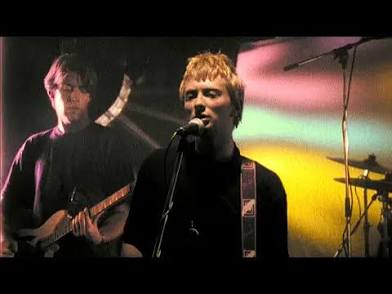In 1994, Britpop was touted as music’s great savior, though it wasn’t entirely clear what, or who, it was saving us from. With Blur and Oasis leading the charge, both bands declared that modern life and music were nothing short of rubbish, setting out with the bold confidence to present their brand of distinctly British identity as the antidote. It was a familiar story, one that marketers and politicians would later latch onto in the following years: take the vague sentiment of something “lost,” and capitalize on the wave of nationalism, nostalgia, and populism that follows in its revival.
For Britpop, that “something lost” was British music’s cultural force—its global appeal and gravitas that had once defined the sound of the UK but had since faded into obscurity. British indie music had a long history of appealing to American audiences, sometimes even adopting American accents to add to the rock swagger. But now, the cockney rebels armed with melodies and power chords stood ready to reclaim England, ready to take the world by storm and remind anyone who doubted the pure dominance of rock and roll. “England is mine,” one of Britpop’s forerunners had proclaimed, “It owes me a living,” echoing a sentiment shared by Morrissey and Noel Gallagher alike.
Meanwhile, Radiohead, from Oxford, were a world apart from all this nationalistic fervor. While the UK’s Britpop scene was busy building its case for British musical supremacy, Radiohead was bouncing between continents, riding the unexpected success of their breakout single, “Creep.” Though a grunge anthem of self-loathing, “Creep” wasn’t quite the soundtrack of the Britpop moment, nor did it belong to the grunge movement. Instead, Radiohead—art school-educated and distinctly European—seemed like outsiders to the scene that they had accidentally been swept into.
In 1993, Damon Albarn of Blur, reflecting on Britpop’s rejection of American grunge, remarked to the NME that “punk was about getting rid of hippies,” and his intention was clear—he wanted to dismantle grunge, too. Britpop’s complex relationship with grunge was ambivalent at best. On the one hand, the scene didn’t outright vilify it (Noel Gallagher, for example, credited Nirvana’s influence on Oasis’ Definitely Maybe), but on the other, British bands who dabbled in grunge were often dismissed as sellouts. At the same time, grunge’s dominance was blamed for stalling the rise of a new, British wave. The British music press was already championing the likes of Supergrass, Pulp, Suede, and Blur as the new musical vanguard that would define a generation.
But beneath the surface, Britpop was more than just an aesthetic rebellion—it was also a political gesture, a product of the time. The British economy had started to recover from a recession, the Tories seemed poised for defeat, and the rise of New Labour promised a future more in tune with business and culture industries. London, already a cultural hub, was becoming the undisputed “coolest city” in the world, as young, affluent Europeans flocked there to partake in the city’s nightlife scene. Britpop capitalized on this optimism, framing itself as the soundtrack to a nation on the verge of rediscovering its cool factor.
In this cultural atmosphere, Blur and Oasis were tasked with drawing a line in the sand, defining the battle lines of Britain vs. America, Labour vs. Tory, and working class vs. middle class. Each band carved their own narrative, with Oasis basking in nostalgia and optimism, while Blur, always the more cynical of the two, presented a more complicated, bittersweet view of modern life. This was a time of political and social friction, but also of celebration.
In contrast, Radiohead didn’t fit neatly into this framework. The band’s music was marked by a unique sense of confusion and discomfort with the state of the world. Their follow-up to “Creep,” the 1995 album The Bends, took a more introspective, politically tinged approach. While still personal, Yorke’s lyrics began to show his growing awareness of the world’s problems. The band’s sonic journey on The Bends was marked by soaring guitars, angst-filled crescendos, and Yorke’s increasingly fragile falsetto. Yet even as they captured the rising disillusionment, their sound was distinct from the brash optimism of Britpop.
Radiohead’s The Bends didn’t dwell in the black-and-white, “us vs. them” dichotomies that defined Britpop. Instead, the album explored a complex web of alienation, suffocation, and personal crisis. Radiohead weren’t interested in celebrating the shiny, optimistic view of Britain being pushed by the mainstream; they were more concerned with examining the fractures of modern life and the existential dread that accompanied it. Yorke’s lyrics captured a world that was “broken,” a place where everything felt “fake,” and gravity, quite literally, “always wins.”
As Radiohead wrestled with these complexities, Oasis remained rooted in a working-class ideal, their music anthemic and unabashedly celebratory. The Gallaghers’ music offered a simple but powerful message—live fast, live free, and have a good time. They were the epitome of the “lad culture” that Britpop embodied, unafraid to speak their mind, even at the expense of alienating the very rock establishment that had helped shape the genre.
In the face of a battle between Britpop’s optimism and Radiohead’s existential malaise, the two bands reflected two different versions of the same disillusioned world. Radiohead’s The Bends was a counternarrative to Oasis’ dream of worldwide domination. Yet, both bands were inextricably tied to the cultural moment. They were both products of a time when Britpop was poised to either reclaim or redefine British identity.
In the end, the real revolution wasn’t about who won the battle between Britpop’s hopeful anthems and Radiohead’s introspective rock. It was about the underlying tension that defined the era—a clash between idealism and pessimism, optimism and reality, all framed within the rapid changes sweeping through Britain and the world at large.
